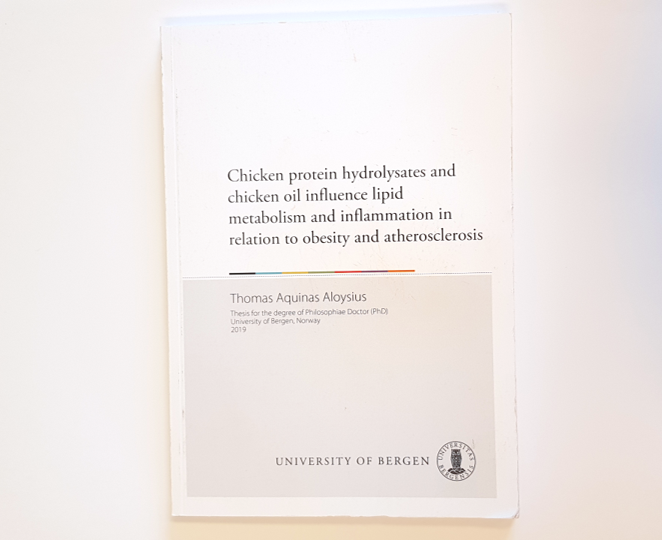PhD degree for studying the effects of chicken hydrolysate on metabolism
Thomas Aquinas Aloysius defended his PhD thesis 13 September 2019 for the PhD at the University of Bergen (UiB): Chicken protein hydrolysates and chicken oil influence lipid metabolism and inflammation in relation to obesity and atherosclerosis. The doctoral student is from Jaffna in Sri Lanka. He has a Master of Science degree in molecular biology from UiB.

Photo: Marije Oostindjer
Overweight and obesity have increased over the past forty years in both Norway and the rest of the world, and this is linked to increased prevalence of lifestyle diseases such as type 2 diabetes, fatty liver and cardiovascular diseases. Studies have shown that obesity can lead to a chronic inflammatory level in the body, and along with increased blood lipid levels this is a major factor for the increased risk of lifestyle diseases. Dietary interventions are an important measure to prevent disease risk.
Enzymatic hydrolysis of chicken plus products gives rise to peptides (small protein units) that can potentially have a direct biological effect in the body. In his doctoral work, Aloysius used chicken hydrolysate produced by Norilia AS, which was found to have beneficial and health-protective effects in animal studies, among other reduced inflammation and reduced blood cholesterol levels. The bioactive peptides also had effects on the fat burning and fatty acid synthesis in rodents.
The doctoral student has shown that obese mice given high fat diets with chicken peptides had lower levels of blood cytokines, suggesting a reduced inflammatory response compared to mice given a control high fat diet. Atherosclerosis can be caused by both increased inflammatory activity and elevated lipid concentration in the bloodstream. In mice where the ApoE gene had been removed, which accelerates plaque formation and atherosclerosis, Aloysius found that chicken peptides reduced fat deposition in the blood vessels, and that this was probably independent of blood lipid level. In normal rats fed an unhealthy high fat diet, the addition of chicken peptides in the diet resulted in lower total blood cholesterol levels compared to other protein sources. This has also been observed previously in preclinical studies on fish peptides. Furthermore, it was interesting to find that a combination of chicken peptides and chicken oil resulted in lower body weight while the fat burning increased.
The findings in this study contribute to an improved understanding of how dietary components can affect obesity and metabolic lifestyle diseases (cardio-metabolic disease). Furthermore, this knowledge can be used to develop new protein supplements. For the last 10 years, the main focus has been on peptides from fish. In this project, the doctoral student shows that chicken peptides also have beneficial and health-protecting properties in preclinical studies.
The PhD project thus helps to increase our knowledge of how amino acid and fat metabolism interact. Furthermore, the project contributes to new sustainable development of residual raw materials from the industry.

*.twig: Marianne Skov Markussen









